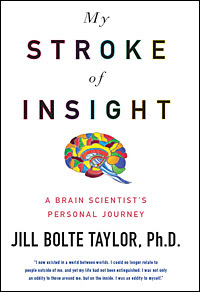Synchronistically, my mother spoke to me about an incredible woman and her story of left-brain stroke and the incredible euphoria she experienced for the several weeks that her left brain was out of service. Apparently she almost regretted getting her left-brain back and describes living with only the right hemisphere active as a kind of nirvana, a growing sense of peace that sounds much like the nirvana described by the Enlightened who have attempted to describe the undescribable in left-brain language (nirvana being, as we now know, a right-brained 'phenomenon'). Interesting (dare I say cute) sidenote, the woman remembered experiencing a feeling of being enveloped by perfect love while she lay in her hospital bed. Only after she wrote about this did her own mother tell her that while she was recovering but unable to recognize anyone, she would lie in her hospital bed next to her and hug her for hours...
The synchronicity I mention comes from another friend (you know who you are) who sent me a similar description the next day with a link to the following article on Jill Bolte Taylor, the woman my mother was telling me about (although she could not remember her name). Cool coincidence in any case. Anyhoo, said friend, also sent me this excerpt from JBT's book, My Stroke of Insight, which kind of brings home the subject of the last three post entries quite well while explaining our need for the left brains 'chatter' to function in this world:
One of the jobs of our left hemisphere language centers is to define our self by saying “I am.” Through the use of brain chatter, your brain repeats over and over again the details of your life so you can remember them. It is the home of the ego center, which provides you with an internal awareness of what your name is, what your credentials are, and where you live. Without these cells performing their job, you would forget who you are and lose track of your life and your identity.Together with the following quote, this time from the above-mentioned article, Ms. Taylor describes the feeling as she was having the stroke:
As the language centers in my left hemisphere grew increasingly silent, my consciousness soared into an all-knowingness, a "being at one" with the universe, if you will. In a compelling sort of way, it felt like the good road home and I liked it.Pretty incredible!
My further thinking on this is that it doesn't seem elegant to me that we should be searching to neutralize the left brain and its chatter to achieve true and lasting 'nirvana', joy, bliss, whatever (and I doubt we would want to always be there even if we could). Based on what we know of the Universe, it would seem to make more sense that we need to find a way to dissipate the duality of the two hemispheres and allow the left to keep us grounded and allow the right to allow us to feel higher emotions, i.e. find a synthesis of the two rather than a promotion of the one over the other. Unity (or advaita (non-duality)) rather than duality... where have I heard that spiritual theme before???
